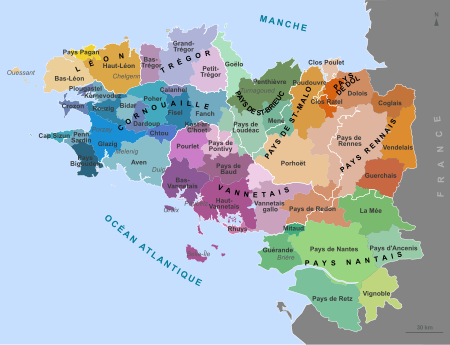Brezhoneg is Looking Up or Vice Versa
 A dictionary is one of those things you just have to have in your house. Unless you have, say, the Internet. But even if you don’t, I expect you haven’t got a Catholicon.
A dictionary is one of those things you just have to have in your house. Unless you have, say, the Internet. But even if you don’t, I expect you haven’t got a Catholicon.
If your response at this point is something along the lines of “Well, no, I’m not Catholic” then you need an encyclopedia. Or, again, for those under 100, the Internet. I’d sure hate to be an encyclopedia salesman these days and I never wanted to be one anyway.
The point is, if you do look up Catholicon in something big enough to have a listing, like your telephone, you will discover that it is the first ever French dictionary, and called the Catholicon because “Katholikon” in Greek, or “Καθολικόν” if you prefer, means “universal”. But it is also, and even primarily, the first ever Breton dictionary. And as it was published on November 5 of 1499, having been written by a Breton priest in 1464, it also has its 6,000 entries in Latin.
That you don’t have to Google. Or French, which you might even speak. But Breton?
Yes. Breton. Or Brezhoneg as it evidently calls itself. It was once pretty big news in Brittany, which is of course not in Britain. It is in France, part of an older Celtic pattern of settlement under which Breton itself is a Brythonic language, which I know thanks to the Interwebs is a family that includes the almost vanished Cornish, semi-vibrant Welsh and extinct Cumbric and was actually brought from Britain to Armorica (sort of Brittany plus much of Normandy) during the Dark Ages when people were fleeing, rampaging or doing both at once over much of that region. And while French eventually became the dominant language in France, unsurprisingly in retrospect but something of a struggle and a government project for quite a while, languages like Breton were big news, as were the “langue d'oc” group, distinct from the langue d’oïl” family because they said oc not oui for yes).
One of the pronounced, so to speak, features of the modern world is a standardization of language along with everything else. And it’s easy to lament the vanishing of quaint things like Cumbric provided you yourself speak, say, English. But it is striking that as recently as 1950 there were around 1 million Breton speakers, some 2% of the French population. And yet today the number is perhaps 200,000, though Wikipedia chirpily notes that “the number of children attending bilingual classes has risen 33% between 2006 and 2012 to 14,709” as though it were on the verge of a major comeback.
It’s not. I’d say Latin has a better chance. (And yes, I’d back such a project without, frankly, having much to contribute to it.) But it is odd to see a language go from first in the first dictionary to what was that again in that fairly brief period, by historical standards, in which you didn’t have to explain to young people what a “dictionary” was.